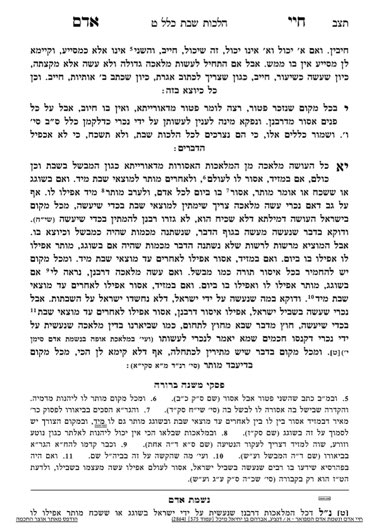Sponsorships for the upcoming Klalim, which discuss the 39 melachos of Shabbos, are available. Please contact Rabbi Reingold for more information at rabbireingold@gmail.com or 301.996.5910
We are continuing in siman 11, discussing the concept of maaseh Shabbos. We learned that there is a difference in deriving benefit between maaseh Shabbos of an issur deoraysa versus an issur derabanan, and that there are some exceptions (e.g., shehiya, chazarah). The Chazon Ish understands within the approach of the Ramban that when Chazal differentiate between maaseh Shabbos of an issur derabanan versus an issur deoraysa, they are not referring to the standard issur derabanan. Issurei derabanan generally come to support an issur deoraysa, and therefore are similar in nature to the issur deoraysa. However, there are certain issurei derabanan that appear to have no relationship to an issur deoraysa, such as the issur to separate terumos and maasros or not to be tovel kailim, and these issurei derabanan are the issurim which have a more lenient status regarding maaseh Shabbos. “Regular” issurei derabanan have the same status as issurei deoraysa regarding when and who can benefit from them.
Looking carefully at the language of the Chayei Adam, the Chayei Adam seems to imply not like the Chazon Ish, because he writes that all melachos derababan are given the same status.
The Chayei Adam continues, and writes that the leniencies of maaseh Shabbos of an issur derabanan only apply to a Jew who performs melacha. We are not concerned that Jews will be mechalel Shabbos for their own benefit, so there is no concern that if the maaseh Shabbos can be used on Shabbos, it will be abused.
On the other hand, when it comes to amira l’achum, if a non-Jew does even an issur derabanan for a Jew, the maaseh Shabbos is assur for everyone until Motzei Shabbos. There are certain examples where amira l’achum on a derabanan is permitted (mitzvah, etc.), but, assuming it was not one of those cases, it is assur. People will not view amira l’achum as stringently as other melachos, and may be tempted to ask for it. Additionally, it is assur bichdei she’yaasu, as we have learned (s295-296).
The Chayei Adam clarifies that if the non-Jew brings something from outside the techum, where the only issur is that it was brought from outside the techum, the item is muttar bedieved even on Shabbos itself. This is a specific exception that chazal allowed.
The Chayei Adam writes that the reason amira l’achum is more stringent that maaseh Shabbos of a Jew is the concern that one will ask the non-Jew to perform the melacha.
The Chayei Adam adds that all of the cases we have discussed until now involve an action which is clearly prohibited, whether mideoraysa or miderabanan. If it is a machlokes whether an action is permitted, the Chayei Adam differentiates that if there is even one opinion that it is muttar–even if we do not pasken in accordance with that opinion–the maaseh Shabbos will be muttar bedieved
Summary
- When it comes to maaseh Shabbos of an issur derabanan, if it was done b’shogeig, it is muttar to everyone even on Shabbos. The Chayei Adam holds that this halacha applies to all issurei derabanan.
- If it was done b’meizid, it is muttar to everyone immediately after Shabbos is over. The Mishnah Berurah disagrees with this, and prohibits it for the individual who did the melacha forever.
- These halachos only apply when a Jew performs a maaseh Shabbos. If a non-Jew performed it, it is always assur until after Shabbos, bichdei sheya’asu. The only exception is an item brought from outside the techum, or amira l’achum for a permitted purpose (mitzvah, etc.)
- If there is a machlokes whether an action is assur or muttar, the maaseh Shabbos will be muttar bedieved.



